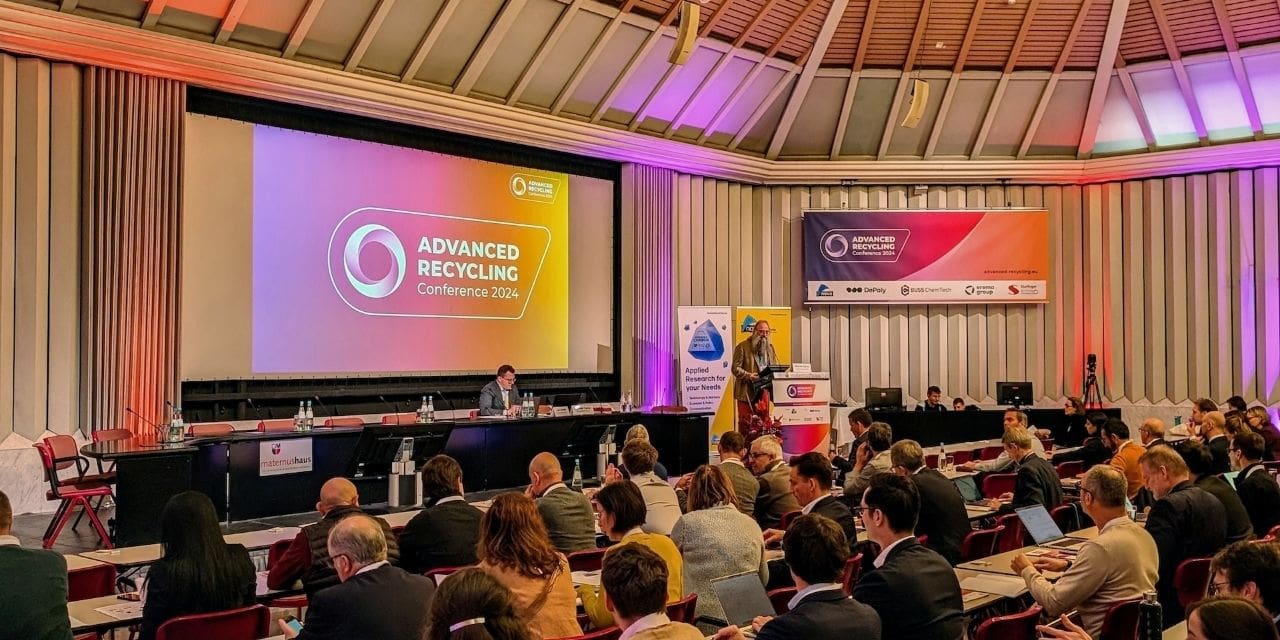Almost 270 delegates attended the Advanced Recycling Conference (ARC) in Cologne on 20-21 November 2024 – the leading advanced recycling conference in Europe
Speakers from leading companies and academic institutions shared insights into the current state and future prospects of advanced recycling technologies, including pyrolysis, gasification, depolymerisation and the emerging star, dissolution at the Advanced Recycling Conference 2024, held in Cologne and online on 20-21 November 2024. The conference received glowing feedback from attendees, who praised the diverse, in-depth and high-quality information presented. Many highlighted the invaluable networking opportunities, which they felt were crucial in a rapidly evolving industry. Attendees frequently commented that the event had exceeded their expectations.
From dissolution to multi-faceted strategies
Recognised as a promising solution for advanced recycling, dissolution was discussed in the context of different materials: ABS and PC (e.g. Trinseo, Netherlands, and ReSolved Technologies, Netherlands), PE and PP (e.g. PureCycle, Belgium, and Reventas, UK), PS (e.g. Polystyvert, Canada) and PVC (e.g. INEOS Inovyn, Belgium). These technologies offer shorter, more energy-efficient recycling routes.
However, the panel discussions and exchanges with the audience revealed a key lesson: no single technology can solve all the challenges. A multi-faceted approach remains essential to meet the diverse needs of advanced recycling.
As plastic waste continues to challenge global environmental sustainability, industry experts are exploring innovative recycling technologies to address complex waste streams. In her presentation, Outi Teräs from Neste (Finland) highlighted the need for physical and chemical recycling to address all plastic waste streams that cannot be managed by mechanical recycling.
The challenges of mechanical recycling
At the Advanced Recycling Conference, attention was drawn to the mechanical recycling of PET, which is well established in Europe, particularly in Germany through schemes such as the bottle deposit programme. While effective, this method faces significant challenges when dealing with complex waste streams such as mixed plastics and textiles. From a process perspective, the mechanical recycling of these materials is very demanding and the resulting recyclate is unsuitable for contact-sensitive applications.
Given these limitations, advanced depolymerisation technologies have been highlighted as promising solutions. Innovations based on solvolysis (e.g. DePoly in Switzerland), solid-state hydrolysis (e.g. matterr in Germany) and enzymolysis (e.g. the EU WhiteCycle project and Plasticentropy in France) show significant potential for addressing complex PET waste streams. These technologies excel at breaking down PET into its monomers, enabling the production of virgin quality recycled PET.
Such advanced processes are seen as ideal candidates for meeting mandatory recycled PET content quotas, offering a way to improve recycling rates and quality in applications where traditional methods fall short.
Pyrolysis as an important recycling route
Pyrolysis, although a longer and more energy-intensive process route than dissolution methods, has emerged as an important recycling route for polyethylene (PE) and polypropylene (PP) waste, particularly for the production of virgin quality recycled polymers suitable for contact-sensitive applications. Its ability to handle diverse waste streams and produce high-quality outputs makes it an essential complement to mechanical recycling.
A notable example is the collaboration between Austrian companies Borealis and OMV, which demonstrates an integrated business model combining pyrolysis and mechanical recycling. OMV’s new demonstration plant with a capacity of 16,000 tonnes per year has recently started operations, and plans are underway for a commercial-scale plant with a capacity of 200,000 tonnes per year by 2028.
Recent advances are further optimising pyrolysis and other thermochemical technologies, with a focus on improving robustness, energy efficiency, yields, product quality and economic performance. For example, AES Autonome Energiesysteme (Germany) is expanding accessibility with small-scale pyrolysis plants, enabling wider adoption. Mura Technology (UK) has developed a process that is tolerant to organic impurities, eliminating the need for pre-drying, while Aduro Clean Technologies (Canada) aims to achieve higher quality outputs without the need for hydrotreatment, significantly shortening the recycling process route.
These innovations demonstrate the growing potential of pyrolysis to address complex plastic waste streams while driving progress towards a circular economy.
The future of advanced recycling in Europe
In the midst of the economic crisis facing Europe’s chemical and plastics industries, advanced recycling offers a compelling opportunity to defossilise the sector and attract much-needed investment. During the session on “Markets, Investment and Financing”, experts examined Europe’s position in this transformation. They highlighted that while European companies may struggle to compete with China in virgin polymer production, a strategic shift to advanced recycling could provide a competitive advantage. By using imported plastic waste as a feedstock for a new, circular chemical industry, Europe could establish itself as a leader in sustainable innovation, fostering resilience and economic growth in the sector.
Faced with the challenges of global market pressures and supply chain vulnerabilities, experts stressed the importance of promoting regional solutions. In his presentation, Gerben Hieminga of ING Group N.V. (the Netherlands) stressed that developing more localised value chains could be an effective solution to reduce dependence on and pressure from international markets.
Marc Spekreijse of Circular Plastics (The Netherlands) pointed out the high revenues the Commission receives from the levy on non-recycled plastics, which is regulated differently in each Member State and is far higher than the additional costs of recycled plastics.

